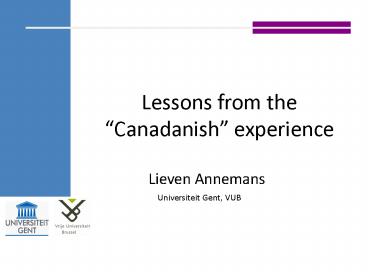Lessons from the - PowerPoint PPT Presentation
1 / 18
Title:
Lessons from the
Description:
Lessons from the Canadanish experience Lieven Annemans Universiteit Gent, VUB Content Recommendations for improved health (care) policy (VGR) Similarities and ... – PowerPoint PPT presentation
Number of Views:71
Avg rating:3.0/5.0
Title: Lessons from the
1
Lessons from the Canadanish experience
Lieven Annemans
Universiteit Gent, VUB
2
Content
- Recommendations for improved health (care) policy
(VGR) - Similarities and differences with Can/Den
- Towards a blueprint for a Flemish health system
- Objections against decentralization
- Final thoughts
3
Recommendations for health (care) policy
- Setting health objectives
- According to population needs
- Increase focus on prevention
- Revise the way health care providers are paid
mix of payment - per practice, per patient, per service, for
quality - Improve cost-effectiveness of interventions in
health - Better alignment (between prevention and cure
between health and social services, between
health and socio-economic status,...) - Adapt education of health care providers to
societal challenges
VGR , 2006
4
Recommendations for health (care) policy
- Setting health objectives
- According to population needs
- Increase focus on prevention
- Revise the way health care providers are paid
mix of payment - per practice, per patient, per service, for
quality - Improve cost-effectiveness of interventions in
health - Better alignment (between prevention and cure
between health and social services, between
health and socio-economic status,...) - Adapt education of health care providers to
societal challenges
VGR , 2006
5
? why further decentralization?
- More efficient health objectives (also including
cure and care) - Payment in function of quality and meeting
objectives - Alignment
- Between health and social services
- Between prevention and cure
- Between health and education, work and housing
(determinants of health) - Between health and training of health
professionals - Better guarantees for integrated care
- Avoid blaming, cost shifting, overlap,
contradictions, inefficiency, double use, gaps,
.... existing in current semi-decentralized
situation
VGR , 2006
6
Content
- Recommendations for improved health (care) policy
(VGR) - Similarities and differences with Can/Den
- Towards a blueprint for a Flemish health system
- Objections against decentralization
- Final thoughts
7
Similarities and differences with Can/Den
- Similarities
- Federal state - regions - subregions
- (Socio)economic differences between regions (Can)
- Language issue (Can)
- Health insurers (Can)
- Differences
- Only decidecentralized
- Cultural differences stronger (cfr J. De
Maeseneer) - Bismarck system (social insurance)
- Brussels
8
Content
- Recommendations for improved health (care) policy
(VGR) - Similarities and differences with Can/Den
- Towards a blueprint for a Flemish health system
- Objections against decentralization
- Final thoughts
9
Towards a blueprint for a Flemish health system
- Financial and political accountability
- Spending power
- Full responsibility for programming, norms and
quality - Integration of prevention, cure and care, and of
first, second and third line (double integration) - Alignment with social services and other
determinants of health - Central role of the general practioner as
gatekeeper (cfr WHO) - Three-layer health care system
- Maintaining solidarity, at least for a well
defined and agreed period of time - Maintain some functions at the central level
(HTA, information system) - Respecting values of equity, effectiveness and
cost-effectiveness
10
Integrated
W. De Meester, 2005
Cfr RHAs, cfr LHIN in Ontario
11
Solidarity? Cfr health care expenses
12
Three layer health care
Regulated competitionbetween insurers
No competitionbetween insurers
W. Demeester, 1999
13
Content
- Recommendations for improved health (care) policy
(VGR) - Similarities and differences with Can/Den
- Towards a blueprint for a Flemish health system
- Objections against decentralization
- Final thoughts
14
Objections (yes, but...)
- What about Brussels?
- Option 1 population chooses (cfr education
- Option 2 Brussels as a separate entity (own
health challenges same size of several Canadian
provinces) - What about the RIZIV/INAMI?
- Transition to regional health agencies,
responsible for steering (layer 1), regulating
(layer 2) and facilitating (layer 3) - Feasibility and plan to be established with
RIZIV/INAMI top - Cross-border care?
- Cfr. European legislation with this regard
- What about solidarity? See earlier argumentation
- Plus see Figures about affordability in Denmark
- Why not recentralizing? See next slide
15
Why recentralization is less of an option
- Are we then going to recentralize social
services, labour, education, ? If not, the same
problems remain if yes, decreasing efficiency in
those fields - Regional models have succeeded in improving
efficiency making the system more
patient-oriented and enhancing
cost-consciousness (Bergman, 1998) - Centralization hinders integrated care, leads to
information overload and being out of touch with
providers (adversely affecting motivation, and
makes it difficult to respond to complex local
conditions (Mur-Veeman, 2008) - HOWEVER limits to decentralization
- Cfr HTA in Canada (CCADTH),
- Cfr. NBOHs role in Denmark
- Cfr. Health information system in Canada (CIHI)
16
Content
- Recommendations for improved health (care) policy
(VGR) - Similarities and differences with Can/Den
- Towards a blueprint for a Flemish health system
- Objections against decentralization
- Final thoughts
17
Final thoughts
- Decentralization is not strange nor unrealistic
- Whatever the approach, strong leadership and
trust are required for effective planning and
sustainability. (Stoto, 2008) (the devil lies in
the detail) - Two attitudes
- Decentralization as goal
- decentralization makes everything better
- Decentralization as a means
- many recommendations for improving our health
care can be made with a decentralization, most
of these recommendations can be better realized
(VGR, 2006) - Equity means solidarity based on objective
criteria and does not mean supporting
inefficiency (cfr unjustified overconsumption)
18
Lessons from the Canadanish experienceTHANK YOU
Lieven Annemans
Universiteit Gent, VUB































